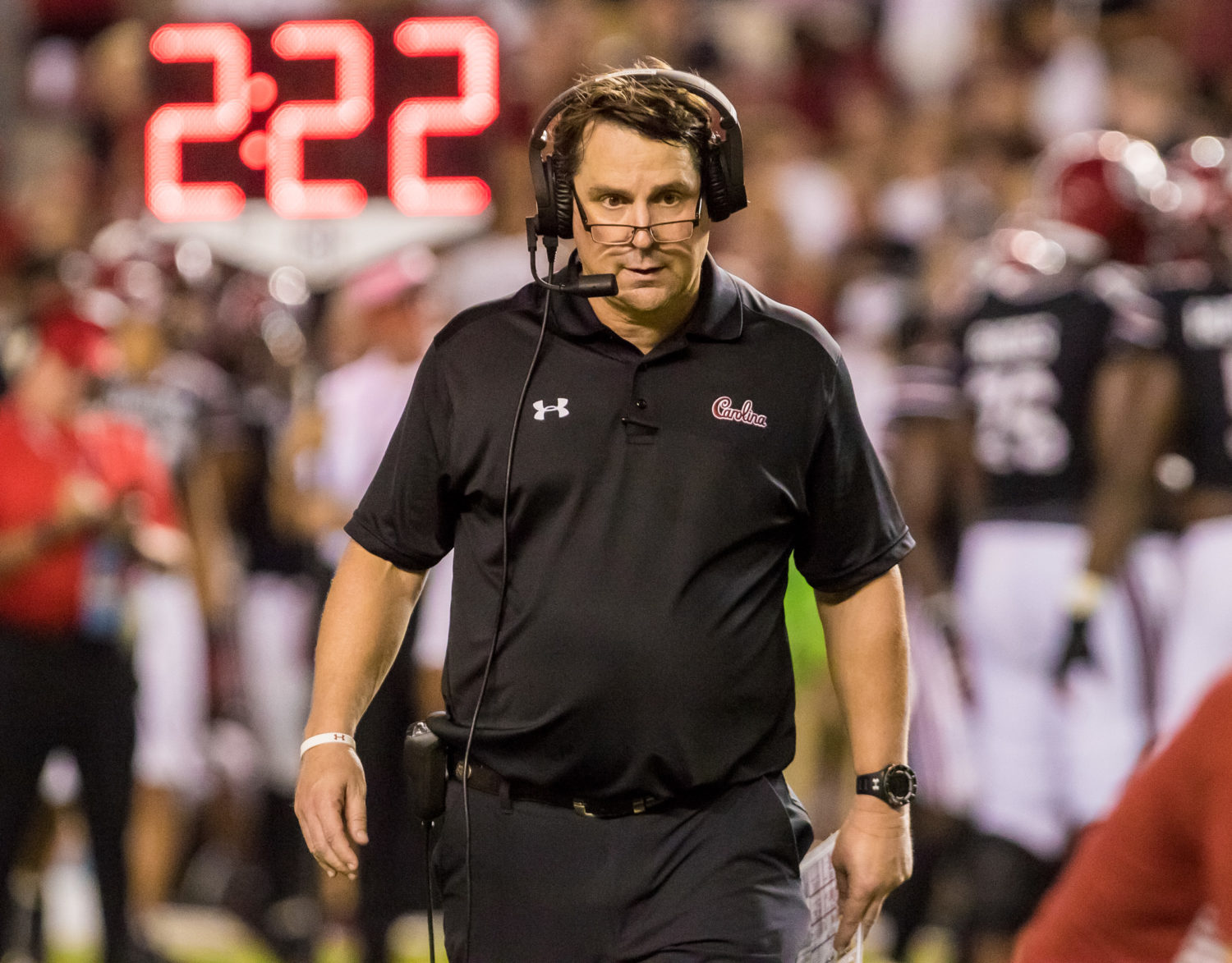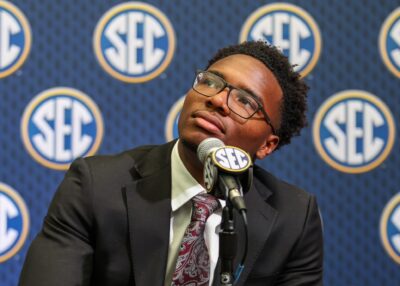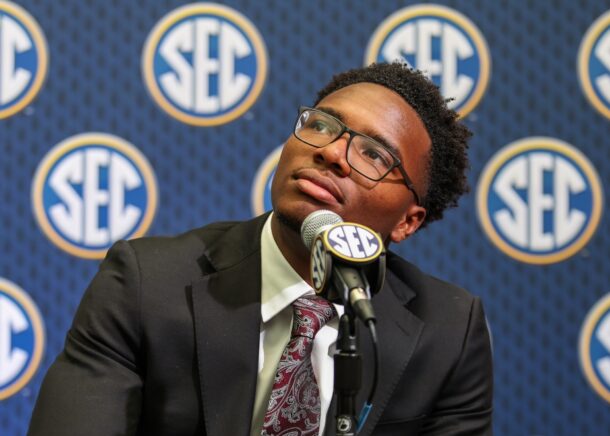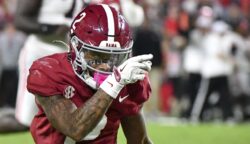
Will Muschamp is running out of chances — and coaches — to fix his team’s offense
Earmuff it, Will Muschamp apologists. You’re not going to like this.
This isn’t going to be some long-winded tip of the cap to Muschamp for hiring Mike Bobo, and if you’re in search for a lengthy column predicting Ryan Hilinski to become one of the nation’s best quarterbacks in 2020, well, you’ve come to the wrong place.
Based on what we’ve seen so far, that discussion isn’t very topical. What’s topical is Muschamp’s continued struggles to find the right offensive equation. An offseason on virtually every hot-seat list in America — his buyout is still in the 8-figure range at $13.2 million — coincided with the aforementioned hiring of Bobo, who was the longtime Georgia offensive coordinator and more recently Colorado State head coach.
If you’re wondering why a defensive-minded coach like Muschamp is associated with an unfavorable offensive trend, take a look at this breakdown of his teams’ scoring offenses and coordinators during his time as a head coach:
[table “” not found /](Side note: I always forget about Weis at Florida during Muschamp’s first year as a head coach. That was back when Muschamp wanted to use a pro-style offense and he claimed that Weis’ success doing that at both levels made him “a perfect fit.”)
If you were keeping track at home, Bobo is Muschamp’s 5th offensive coordinator entering his 9th year as a Power 5 head coach. During those 8 seasons, Muschamp’s offenses have:
- A) Averaged No. 87 scoring finish
- B) Never finished in the top 50 in FBS
- C) Finished worse than No. 100 in scoring 38% of the time
- D) Never had an OC leave on good terms
- E) All the above
It’s “E.” It’s always “E.”
The inability to clear those offensive hurdles overshadowed Muschamp’s defensive success. He posted 5 top-25 defenses in the 2010s and he only has 1 season finishing worse than No. 55 , which is why he’s getting a ninth season to coach in the SEC (an 8-figure buyout also probably played a part in that). Still, Muschamp has just 2 seasons of winning conference records.
I tend to think at the root of all of those issues is Muschamp’s struggles to evaluate offensive personnel. I realize I’m not alone in that thought.
It’s worth mentioning that recruiting blue-chip quarterbacks has never been an issue for Muschamp. The amount of blue-chip quarterbacks who signed with his teams is well-documented:
- 5-star Jeff Driskel, 2011 (Urban Meyer recruited him but Muschamp kept him committed)
- 4-star Jacoby Brissett, 2011 (see “Jeff Driskel)
- 4-star Will Grier, 2014
- 4-star Treon Harris, 2014
- 4-star Brandon McIlwain, 2016 (Steve Spurrier recruited him but Muschamp kept him committed)
- 4-star Jake Bentley, 2016
- 4-star Dakereon Joyner, 2018
- 4-star Ryan Hilinski, 2019
- 4-star Luke Doty, 2020
That’s 9 blue-chip quarterbacks, yet Hilinski and Doty are the only ones who haven’t either transferred away from the school who signed them or switched positions (Joyner is now at receiver). Granted, Grier and Harris left after Muschamp was fired from Florida.
Still, though. It’s stunning that no matter what combination of blue-chip quarterback and offensive coordinator Muschamp brings in, it just doesn’t work.
Every new coordinator is billed as “the one who will finally make it happen” (I still remember when McClendon’s 2018 offense was getting hype as “old-school Oregon”). I get that to a certain extent. I mean, what else is Muschamp supposed to say? “I haven’t had much offensive success, so fingers crossed that it works out this time.” Yeah, that’s not how this works.
Unless Bobo turns out to be a revelation in Columbia and he’s 1-and-done because a better opportunity comes along, it doesn’t feel like Muschamp will get another chance to spin a new offensive coordinator hire. Back in January, Muschamp spun the Bobo hire with some cold, hard numbers:
“I’m excited to bring Mike on board. He is a proven and respected play-caller and quarterbacks coach, who I have faced many times over the years. Over the last 13 years, his offenses have averaged over 31 points and 424 yards per game while converting over 43% on 3rd down.”
For what it’s worth, averaging 31 points per game would’ve barely cracked the top 50 in FBS in 2019, 424 yards per game was just outside the top 50 in FBS and 43% on 3rd down would’ve been somewhere in the top 31-40 range. But hey, that’s better than the Muschamp offensive standard!
That’s also more reassuring to fans than “we played together at Georgia and I’ve always liked the guy.” At this point, Muschamp knows it’s all about numbers.
Think of this as Muschamp sitting at the poker table. Back at Florida, he started off with a full stack of chips to play against his SEC competitors at the table. With each year of a failed offense in Gainesville, he lost more and more chips until he went all in and lost with Roper in 2014. Muschamp getting hired at South Carolina was like him buying back in. But once again, his chip stack dwindled away, and now with Bobo, he’s all in.
Ideally, one wouldn’t be all in coming off a 4-win season with an upcoming schedule that’s loaded with 7 games against teams who had 8-plus victories last year (4 of those teams finished ranked in the top 6 of the Associated Press Poll). And surely a coordinator who had the nation’s No. 108 and No. 71 offenses the last 2 years isn’t a lock to hit.
But that’s Muschamp’s reality after playing too many bad hands. Sometimes he failed to recognize when he should fold (sticking with Driskel). Other times he failed to recognize when he had a good hand that was worth seeing through (not starting Brissett and watching him transfer). And of course, there was the time he infamously chose Harris over Grier.
All of those Florida missteps followed Muschamp to South Carolina. If they didn’t, we’d only be talking about how McIlwain didn’t work out and Bentley lost his job because of injury. Or rather, we’d only be talking about how Roper was dealt a tough hand and McClendon’s revamped modern offense was plagued by youth and injuries in its 2nd season.
Go figure that McClendon led South Carolina to the No. 82 rushing offense, which was (sadly) the best of the 4 years of the Muschamp era. As Gamecock fans will often remind people, it’s hard to put all the blame on Muschamp’s quarterback failures when his teams can’t run the ball. If the highly touted true freshman MarShawn Lloyd could do his best Marcus Lattimore imitation, that would make Bobo’s job a whole lot easier. That, obviously, will be easier said than done.
“Easier said than done” has become the mantra to describe Muschamp’s offenses. To his credit, he’s always been willing to pivot. If he had been stubborn with an unwillingness to shake it up on that side of the ball, he wouldn’t be entering Year 9 as an SEC coach.
But all signs point to him being out of moves. Muschamp is all in again.
Winning is the only way he’ll keep his spot at the table.
Connor O'Gara is the senior national columnist for Saturday Down South. He's a member of the Football Writers Association of America. After spending his entire life living in B1G country, he moved to the South in 2015.







